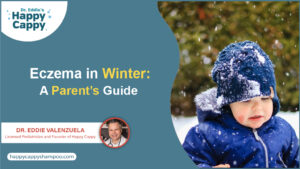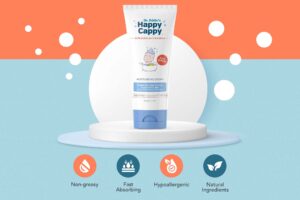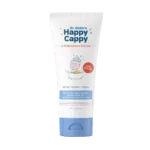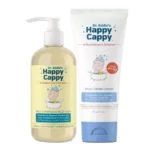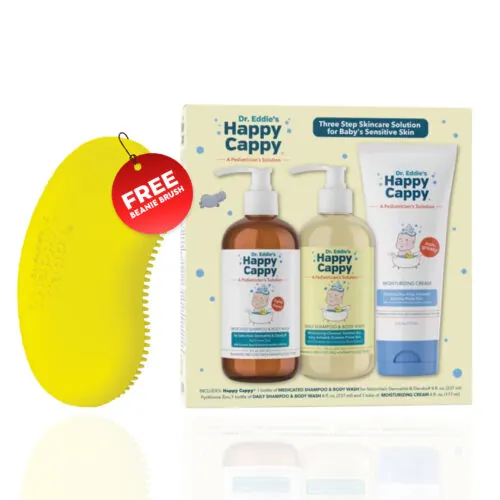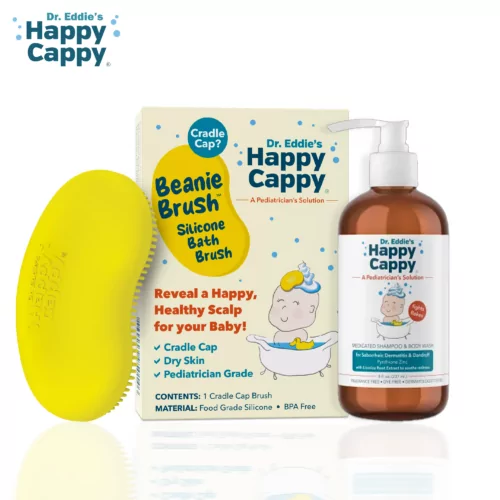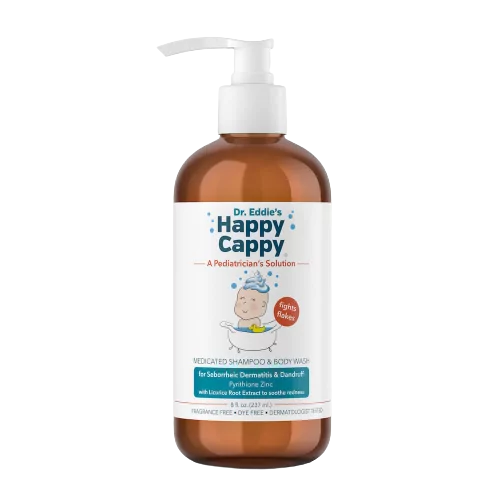Just as good paint protects your house from rain, heat, or snow, similarly, healthy skin protects you by acting as a barrier. But this barrier doesn’t function properly if you or your child has eczema. The result is dryness and skin irritation by humidity, cold, heat, and wind.
What is Eczema (Atopic Dermatitis)?
Eczema is a chronic skin condition in which skin becomes scaly, itchy, and irritated. There are many types of eczema, yet most people are referring to atopic dermatitis when they are referring to the dry skin condition on kids’ cheeks, arms, and legs that most commonly occurs in children under the age of 5 years old. Eczema, however, can start at any age. When occurring in a child under the age of 1 it may be known as baby eczema. According to the American Academy of Dermatology, about 60% of the population experience it in the first 5 years of their life.
Winter Eczema (Atopic Dermatitis)
The winter season can be a real crowd-pleaser…warm cozy clothes, holiday music, and hot sweet beverages—eggnog anyone? But winter can be harsh for eczema sufferers as the temperature plunges and the furnace fires up.
Does Eczema Get Worse in the Winter?
The answer is yes, yours or your child’s skin can get worse in the winter. In clinical practice, I find that when the temperature drops outside, children and their parent’s lips become cracked and especially exposed skin becomes xerotic–a fancy word for dry.
A group of European authors combed through the scientific literature and concluded that skin barrier function decreases when humidity and temperatures drop and that outside irritants and allergens can easily damage skin.
What Causes Winter Eczema Flare-up?
Eczema is believed to be caused by a combination of factors. Genetics, environmental factors, and skin barrier dysfunction are believed to be the key factors. Various environmental factors can trigger eczema and eczema flare-ups.
Extreme weather conditions, such as winter, are one of them. Certain winter elements can contribute to your child’s eczema flare-up.
- Dry air
- Central heating system
- Lack of moisture in the air
- Hot showers
- Dry skin
Eczema Symptoms in Winter
Eczema symptoms appear when cold or dry weather strips the skin of its natural moisture. Although eczema flare-ups can occur anywhere on the body, the most common locations are the hands, face, elbows, and knees.
Some prominent symptoms of winter eczema are:
- Sensitive skin
- Brown or red patches that occur on the skin
- Cracked, scaly, and thick skin
- Severe itching on the skin
- Raised bumps on the skin
- Dryness
- Red rashes
The symptoms of eczema vary in people with different age groups. Some other conditions, for example, hay fever and asthma, are also associated with eczema in children.
Managing Eczema in Winter
Here are some tips to get your child more comfortable during the winter and prevent winter eczema flare-ups.
Lukewarm Baths
Doctors’ Orders—Don’t bathe your child in hot water. Although it may be tough, daily baths with lukewarm water help manage the symptoms of eczema.
- Use an eczema shampoo and body wash specially formulated for babies.
- A good eczema body wash will avoid common skin irritants, which we know is important since skin barrier function can be less than optimal when it is cold outside.
- Limit the bathing time of your child to 10 minutes.
- Avoid rubbing the baby’s skin with a towel. Rubbing can scratch eczema, making the condition worse. It is best to pat dry.
Moisturize Often
Keeping your baby’s skin moisturized is a crucial step during the winter. Heavier and thicker moisturizers should be used, which can soothe and hydrate sensitive skin. A better option for restoring the skin barrier is baby eczema cream. It is important to note that “creams” are thicker than “lotions,” and are the best way to protect and hydrate the skin.
- Moisturize the baby’s skin immediately after the bath while their skin is still a little damp.
- Make sure to moisturize the skin at least twice daily.
- Apply the eczema cream to the baby’s body before bedtime as the dryness can worsen itching.
- Use an eczema cream that is hypoallergenic, fast-absorbing, and contains natural ingredients like licorice root extract.
Avoid Scratchy Fabric
With winter comes layers of warm clothes, wool hats, and cozy gloves. However, these winter clothes are usually made of scratchy, rough fabric, which can further exacerbate eczema.
It is preferable to opt for soft, breathable fabrics like cotton. These are more palatable for eczema prone skin and do not cause as much friction with the skin. Choose the same type of fabric for your baby’s bedding.
Keep the Nails Short
Babies are not aware of the harm they are causing when they scratch their eczema affected skin. Keeping their nails short will minimize the damage done when scratching. Learn more about how to prevent a baby from scratching eczema.
Choose The Right Detergent
Choosing the right detergent is as important as choosing the right baby products. A baby’s skin becomes more sensitive when experiencing eczema and the fragrance or harsh chemicals in the detergent can worsen their condition.
- Make sure to wash baby’s clothes, bedding, swaddles, and blankets in a fragrance-free detergent.
- Wash new clothes before using them.
- It is a good idea to avoid using dryer sheets altogether, but if you must use them to avoid static use a brand that is irritant-free and scent-free.
Watch Out for Indoor Allergens
Dust mites or pet dander are some of the indoor allergens, in the face of a more permeable skin barrier, that can also trigger eczema flares. Here are some other tips:
- Frequently wash bedding
- Keep floors cleaned
- Change home air filters frequently
- Remove stuffed animals (sorry Teddy Bear), as these are dust accumulators
- Keep pets out of rooms where you or your child sleeps.
- Establish a regular vacuum-cleaning schedule.
Use a Humidifier
Central heating systems in our home blow hot air to keep the environment warm. This hot air removes the humidity from the air and makes it dry. This dry air becomes a trigger for eczema flare-ups.
- A humidifier can help add moisture to the air, it emits water vapors that help keep the air moist.
- However, make sure to clean the humidifier regularly to prevent bacteria from growing.
- The National Eczema Society suggests keeping the temperature of your house or room at 18℃.
To learn more about how a humidifier can help eczema read our blog here.
Work With Your Pediatrician
It is important to stay in touch with your child’s pediatrician. If the baby’s eczema is getting severe or not getting better with at-home management it is best to consult a doctor. They will prescribe a treatment plan according to the severity of the condition and age of the baby.
The doctor may prescribe medications or topical ointments. Although there is no permanent cure for eczema, with the help of a pediatrician, you will be able to treat it properly and prevent future flare-ups.
FAQs
Is it normal to experience eczema in winter?
Yes, eczema flare-ups are widespread in winter. The dry air and decreased humidity can cause the skin to dry out and trigger eczema.
How to manage eczema in winter?
There are a few simple steps that you can follow to manage your eczema in winter and prevent future flare-ups.
1 Avoid long hot water baths.
2 Keeping the air humid with the help of a humidifier can help.
3 Keep the skin moisturized at least twice a day.
Is eczema a seasonal skin issue?
No, eczema is not a seasonal issue but a chronic skin condition. That means it can come and go at any time. But the winter season can trigger an eczema flare-up or make the condition worse.
What temperature is best for eczema?
It is advised to keep the room temperature cool if you are experiencing eczema. The best temperature ranges from 68 to 72 degrees Fahrenheit.
Which moisturizer is best for the winter season?
A moisturizer that is non-greasy, fast-absorbing, and has licorice root extract and glycerin as an ingredient is an excellent choice to keep the skin moisturized in winter. Happy Cappy Moisturizing Cream is a great option as it is clinically tested and vegan-friendly.

